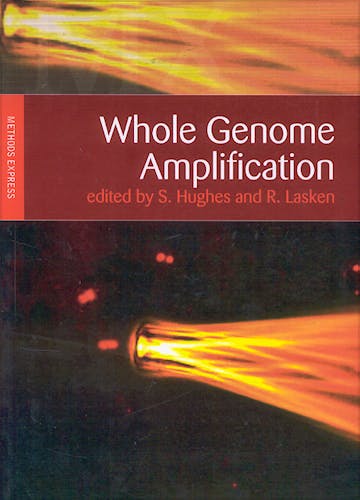

No hay productos en el carrito



Whole Genome Amplification
Lasken, Huges
1ª Edición Abril 2005
Inglés
Tapa blanda
193 pags
500 gr
18 x 25 x 1 cm
ISBN 9781904842071
Editorial scion
Recent advances in the study and understanding of human disease have largely been
made possible by advances in molecular biology methodology. However, as the number
and variety of laboratory techniques increases, so does the requirement for sufficient
quantities of genomic DNA. This shortfall in availability of DNA has been addressed
by the development of a number of whole genome amplification (WGA) approaches.
Using these methods, it is possible to generate microgram quantities of DNA starting
with as little as one nanogram of genomic DNA and in some cases even a single
eukaryotic or bacterial cell. The implementation of such WGA methods provides
an ample supply of DNA for large-scale genetic studies. This book will be welcomed
by experienced researchers wishing to take advantage of the latest developments
and by newcomers to the field who need to rapidly identify reliable techniques
and approaches that will yield success in the laboratory.
Contents:
- 1. Introduction to whole genome amplification
José M. Lage and Paul M. Lizardi, both at Yale University School of Medicine, USA - 2. Single nucleotide polymorphism typing using degenerate-oligonucleotide-primed
PCR-amplified products
Makoto Bannai, Olympus Corporations, Tokyo, Japan and Katsushi Tokunaga, University of Tokyo, Japan - 3. Whole genome amplification by improved primer-extension pre-amplification
PCR
Peter J. Wild and Wolfgang Dietmaier, both at University of Regensburg, Germany - 4. Global amplification using SCOMP: single-cell comparative genomic hybridization
Nona C.R. Arneson, Ontario Cancer Institute, Canada, Arezou A. Ghazani, Unversity of Toronto, Canada and Susan J. Done, Ontario Cancer Institute, Canada - 5. PRSG, a whole genome amplification method based on adaptor-ligation PCR
of randomly sheared genomic DNA
Hiroki Sasaki and Kazuhiko Aoyagi, both at National Cancer Research Institute, Japan - 6. GenomePlex whole genome amplification
Simon Hughes, Gabrielle Sellick, Richard Coleman, all Institute of Cancer Research, UK and John Langmore, Rubicon Genomics, Ann Arbor, USA - 7. DNA linear amplification Chih Long Liu, Bradley E. Bernstein and Stuart L. Schreiber, all at Harvard University, USA
- 8. Multiple displacement amplification of genomic DNA
Roger Lasken, Allegheny-Singer Research Institute, Pittsburgh, USA - 9. Multiple displacement amplification from single bacterial cells
Roger S. Lasken, Allegheny-Singer Research Institute, Pittsburgh, USA; Arumugham Raghunathan, Qiagen Inc, Valencia, USA; Thomas Kvist, Biocentrum-DTU, Denmark; Thomas Ishøy, Allegheny-Singer Research Institute, Pittsburgh, USA; Peter Westermann, Biocentrum-DTU, Denmark; Birgitte K. Ahring, Biocentrum-DTU, Denmark and Robert Boissy, Allegheny-Singer Research Institute, Pittsburgh, USA - 10. Genome amplification tolerant to sample degradation: application to
formalin-fixed, paraffin-embedded specimens
G. Mike Makrigiorgos, Dana Farber/Brigham and Women’s Cancer Center, Boston, USA - 11. Pre-implantation genetic diagnosis using whole genome amplification
Alan H. Handyside, London Bridge Fertility, UK, Mark D. Robinson, University of Leeds, UK and Francesco Fiorentino, GENOMA, Rome,
Italy - Index
© 2026 Axón Librería S.L.
2.149.0